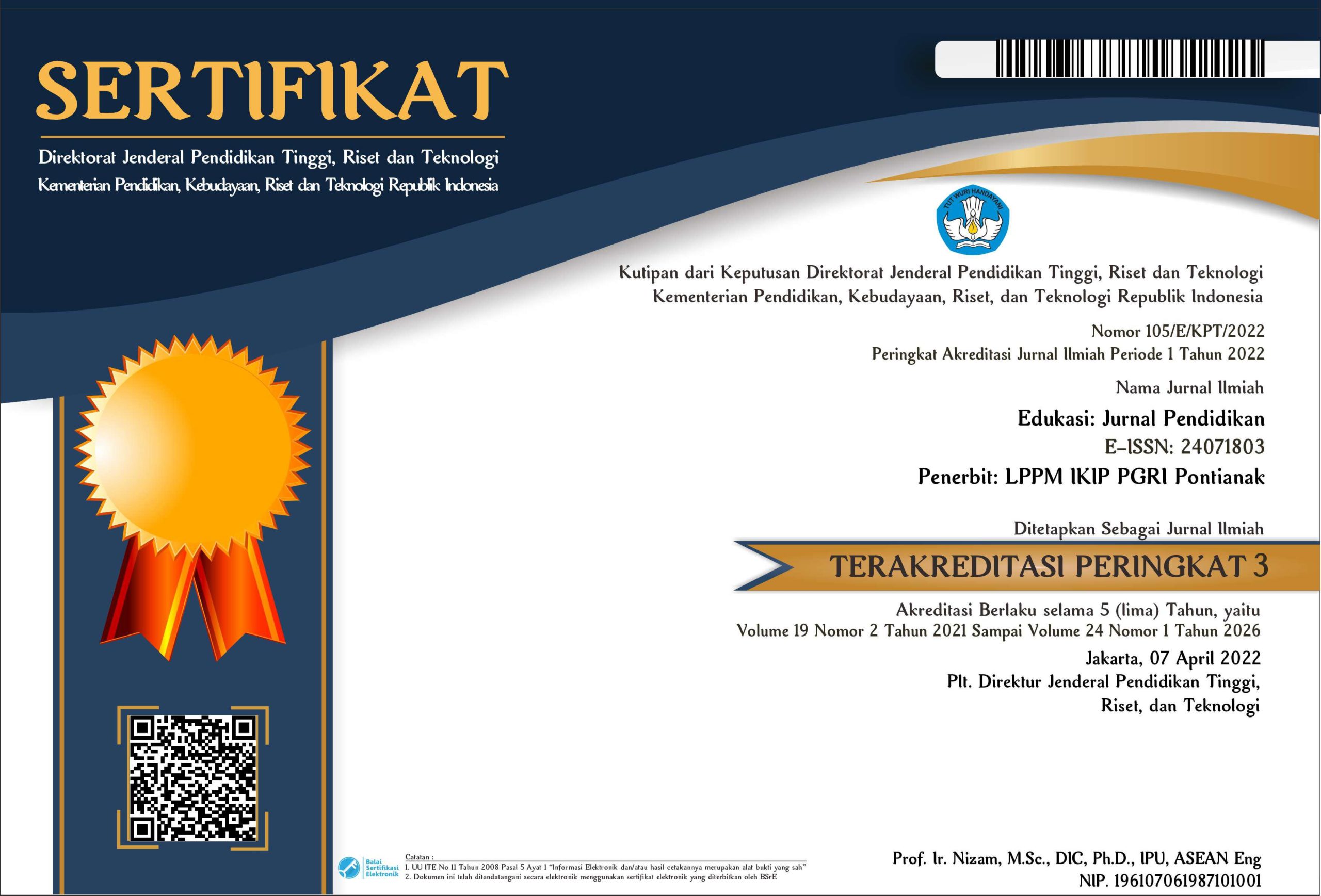Pengaruh Pembelajaran Berbasis Entrepreneurship dan Disiplin Belajar terhadap Hasil Belajar Manajemen Optik
DOI:
https://doi.org/10.31571/edukasi.v18i2.1859Keywords:
pembelajaran entrepreneurship, disiplin belajar, hasil belajar, entrepreneurship learning, learning discipline, learning outcomesAbstract
Abstrak
Tujuan dari penelitian untuk menguji pengaruh pembelajaran berbasis entrepreneurship dan disiplin belajar terhadap hasil belajar Manajemen Optik. Penelitian menggunakan metode korelasional. Subjek penelitian adalah mahasiswa mata kuliah Manajemen Optik sebanyak 30 orang. Alat pengumpul data adalah angket dan dokumen hasil belajar Manajemen Optik. Data dianalisis dengan menggunakan regresi ganda. Temuan penelitian menunjukkan bahwa: terdapat pengaruh pembelajaran berbasis entrepreneurship terhadap hasil belajar Manajemen Optik; disiplin belajar berpengaruh terhadap hasil belajar Manajemen Optik; dan terdapat pengaruh pembelajaran berbasis entrepreneurship dan disiplin belajarsecara bersama-sama terhadap hasil belajar Manajemen Optik.
Â
Abstract
The purpose of the research was to examine the effect of entrepreneurial learning and learning discipline on learning outcomes in Optical Management. This research used a correlational method. The research subjects were 30 students from the Optical Management course. Data collection tools are questionnaires about learning disciplines and study documentation of learning outcomes in Optical Management. Data were analyzed using multiple regression. The research findings showed that there was an effect of entrepreneurship learning on learning outcomes in Optical Management, learning discipline affects learning outcomes in Optical Management, and there is an effect of entrepreneurship learning and learning discipline together on learning outcomes of Optical Management.
Downloads
References
Agustina, R. & Nopiani, A. 2017. Pengaruh Disiplin Belajar dan Lingkungan Teman Sebaya terhadap Hasil belajar Mahasiswa Akuntansi STIE Nasional Banjarmasin. Dinamika Ekonomi-Jurnal Ekonomi dan Bisnis, 10(2): 49-62.
Altinay, L., Madanoglu, M., DeVita, G., Arasli, H., & Ekinci, Y. 2016. The Interface between Organizational Learning Capability, Entrepreneurial Orientation, and SME Growth. Journal of Small Business Management, 54(3): 871-891.
Ardianto, D. & Rubini, B. 2016. Comparison of Students' Scientific Literacy in Integrated Science Learning through Model of Guided Discovery and Problem Based Learning. Jurnal Pendidikan IPA Indonesia, 5(1): 31-37.
Badan Pusat Statistik. 2017. Tingkat Pengangguran Terbuka (TPT) pada Februari 2017 (y-o-y) Mengalami Penurunan Sebesar 3,88 Persen dalam https://boalemokab.bps.go.id/pressrelease/2017/05/29/298/tingkat-pengangguran-terbuka--tpt--pada-februari-2017--y-o-y--mengalami-penurunan-sebesar-3-88-persen.html. Diakses 6 Juni 2020.
Badan Pusat Statistik. 2016. Agustus 2016: Tingkat Pengangguran Terbuka (PTP) Sebesar 5,61 Persen dalam https://www.bps.go.id/pressrelease/2016/11/07/ 1230/agustus-2016--tingkat-pengangguran-terbuka--tpt--sebesar-5-61-persen.html#:~:text=Youtube-,Agustus%202016%3A%20Tingkat%20 Pengangguran%20Terbuka,TPT)%20sebesar%205%2C61%20Persen. Diakses 6 Juni 2020.
Badan Pusat Statistik. 2016. Februari 2016: Tingkat Pengangguran Terbuka (PTP) Sebesar 5,50 Persen dalam https://www.bps.go.id/pressrelease/ 2016/05/04/1231/februari-2016--tingkat-pengangguran-terbuka--tpt--sebesar-5-50-persen.html. Diakses 6 Juni 2020.
Ganefri. 2013. The Development of Production-Based Learning Approach to Entrepreneurial Spirit for Engineering Students. Journal Asian Social Science, 9(12): 162-167.
Ganefri, Hidayat, H., Kusumaningrum, I., & Mardin, A. 2017. Needs Analysis of Entrepreneurships Pedagogy of Technology and Vocational Education with Production Based Learning Approach in Higher Education. International Journal on Advanced Science, Engineering and Information Technology, 7(5): 1701-1707.
Hasanah, H. & Malik, M. 2018. Teaching Factory-Based for Entrepreneurship Learning Model in Vocational High Schools. International Conference on Indonesian Technical Vocational Education and Association (APTEKINDO 2018). Surabaya: 11-14 Juli 2018. Hal: 209-213.
Hidayat, H. 2017. How to Implement Technology Science for Entrepreneurship by Using Product-Based Learning Approach and Participatory Action Learning System in Higher Education?. Advanced Science Letters, 23(11): 10918-10921.
Kakouris, A. 2015. Entrepreneurship Pedagogies in Lifelong Learning: Emergence of Criticality? Learning, Culture and Social Interaction, 11(6): 87-97.
Kusuma, E. & Siadi, K. 2010. Pengembangan Bahan Ajar Kimia Berorientasi Chemo-Entrepreneurship untuk Meningkatkan Hasil Belajar dan Life Skill Mahasiwa. Jurnal Inovasi Pendidikan Kimia, 4(1): 544-551.
Litzky, B. E., Godshalk, V. M., & Walton-Bongers, C. 2010. Social Entrepreneurship and Community Leadership: A Service-Learning Model for Management Education. Journal of Management Education, 34(1): 142-162.
McDonald, C. A. 2016. STEM Education: A Review of the Contribution of the Disciplines of Science, Technology, Engineering and Mathematics. Science Education International, 27(4): 530-569.
Neck, H. M. & Corbett, A. C. 2018. The Scholarship of Teaching and Learning Entrepreneurship. Entrepreneurship Education and Pedagogy, 1(1): 8-41.
Nurfitriyani, M. 2015. Pengaruh Kreativitas dan Kedisiplinan Mahasiswa terhadap Hasil Belajar Kalkulus. Formatif: Jurnal Ilmiah Pendidikan MIPA, 4(3): 219-226.
Rahimi, M. & Karkami, F. H. 2015. The Role of Teachers' Classroom Discipline in Their Teaching Effectiveness and Students' Language Learning Motivation and Achievement: A Path Method. Iranian Journal of Language Teaching Research, 3(1): 57-82.
Sari, N. & Surya, E. 2017. Analysis Effectiveness of Using Problem Posing Model in Mathematical Learning. International Journal of Sciences: Basic and Applied Research (IJSBAR), 33(3): 13-21.
Saroyan, A. & Trigwell, K. 2015. Higher Education Teachers’ Professional Learning: Process and Outcome. Studies in Educational Evaluation, 46(September): 92-101.
Scott, J. M., Penaluna, A., & Thompson, J. L. 2016. A Critical Perspective on Learning Outcomes and the Effectiveness of Experiential Approaches in Entrepreneurship Education: Do We Innovate or Implement?. Education+ Training, 58(1): 82-93.
Secundo, G., Del Vecchio, P., Schiuma, G., & Passiante, G. 2017. Activating Entrepreneurial Learning Processes for Transforming University Students’ Idea Into Entrepreneurial Practices. International Journal of Entrepreneurial Behavior dan Research, 23(3): 465-485.
Sugiyono. 2016. Statistik untuk Penelitian. Bandung: Alfabeta.
Sutrisno. V. 2016. Faktor-Faktor yang Mempengaruhi Hasil Belajar Siswa pada Pembelajaran Praktik Kelistrikan Otomotif SMK di Kota Yogyakarta. Jurnal Pendidikan Vokasi, 6(1): 111-120.
Yussi, S. 2017. The Contribution of Vocational Students’ Learning Discipline, Motivation and Learning Results. International Journal of Environmental and Science Education, 5(12): 965-970.
Zhu, Y., Rooney, D., & Phillips, N. 2016. Practice-Based Wisdom Theory for Integrating Institutional Logics: A New Model For Social Entrepreneurship Learning and Education. Academy of Management Learning dan Education, 15(3): 607-625.
Downloads
Published
How to Cite
Issue
Section
License
Authors who publish in this journal agree to the following terms:
- Authors retain copyright and grant the journal the right of first publication with the work simultaneously licensed under a Creative Commons Attribution License (CC-BY-NC) that allows others to share the work with an acknowledgment of the work's authorship and initial publication in this journal.
- Authors are able to enter into separate, additional contractual arrangements for the non-exclusive distribution of the journal's published version of the work (e.g., post it to an institutional repository or publish it in a book), with an acknowledgment of its initial publication in this journal.
- Authors are permitted and encouraged to post their work online (e.g., in institutional repositories or on their website) prior to and during the submission process, as it can lead to productive exchanges, as well as earlier and greater citation of published work.

 Download: 238
Download: 238


















